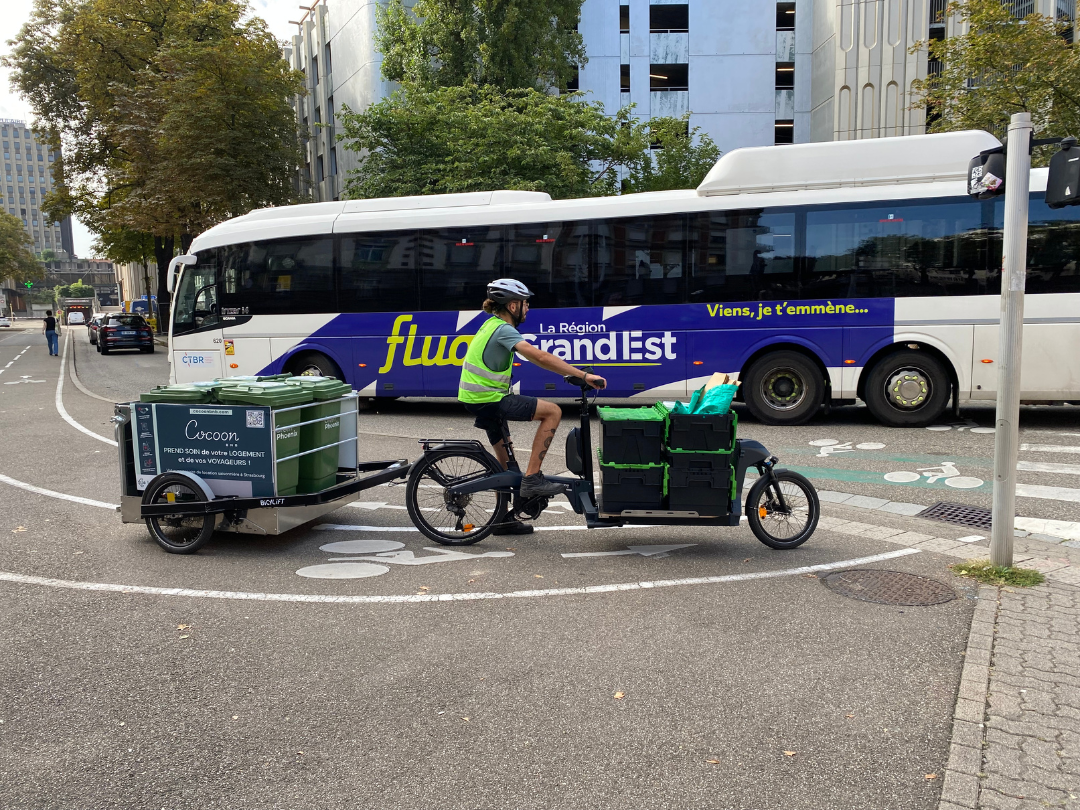Thumbs up to e-bikes

As mentioned in my previous article: Driving emissions targets, a very significant reduction in transport emissions is critical if Australia is to reach the government target of a 62%-70% reduction in emissions by 2035. Bicycles, particularly electric bikes, have the potential to play a major role in this transition by offering emissions-free transport.
These days, e-bikes are a serious mode of transport. They allow people to ride who might otherwise struggle, especially on longer rides, on a regular bike. E-cargo bikes are increasingly used by young families as second, or even a primary vehicle. Watching the e-bikes dropping off kids at schools is a welcome contrast to the sight of road-clogging (and potentially dangerous) cars which fill the streets around schools at drop-off and pick-up. E-bikes can also be used extensively by businesses, potentially replacing highly-polluting diesel trucks and delivery vans, as illustrated by the photo above. [Strasbourg_cleaners_ bike]
The widespread adoption of electric bikes as a key player in the transport mix is best supported by two policy decisions: a reduction in road speed limits and encouragement for bringing electric bikes onto public transport.
Local councils in Victoria now have the ability to set speed limits of 30km/h in school zones and city streets. Designed to increase safety for pedestrians and cyclists, the change is supported by a recent study from RMIT University. The study found that, while a pedestrian hit by a car at 50km/h had an 85% chance of dying, reducing the speed to 30km/h reduced this to a 10% chance of dying. A similar drop in cyclist injuries with a reduced speed is indicated.
Concerns for safety are a leading reason for people to avoid cycling. A survey by The Conversation, found that more than three quarters of those surveyed were interested in bike riding, but only if it was safe. A reduction in speed limits to 30km/h would be a great incentive to anyone considering riding a bike.
The second policy decision – encouraging cyclists to use public transport – should play a major part in people taking up bike riding. Despite this, the government in Victoria is proposing a ban on e-bikes on trains due to the safety risk of lithium-ion batteries catching fire. NSW opted to ban modified e-bikes but did not impose a ban on other e-bikes. At the time of writing, Victoria is still considering a ban on all e-bikes.
Bicycle Network, the peak body representing cyclists in Australia, has a campaign opposing the blanket banning of e-bikes on public transport. The organisation recognises that it is reasonable to ban modified and illegal bikes for safety reasons. Bicycle Network points out that many people need to have access to public transport with their e-bikes to complete their commute. This includes people travelling to work as well as a large number of students. If interested, you can support the campaign by writing to your local member. If you are a regular rider, you might want to consider joining Bicycle Network. Besides advocacy, the organisation provides a wide range of member services, including insurance, a callout service for emergencies and breakdowns and bike parking. Bicycle Network also organises the iconic Great Vic Bike Ride and Around the Bay rides.
With a clear target for emissions reductions, we should be doing everything we can to encourage the use of active transport, such as e-bikes. Pollution-free and a healthy mode of transport, they are a great alternative to cars. They should be considered a key piece of the transport puzzle. Wherever possible, obstacles to their use should be removed. The European attitude of positive encouragement of bicycles through better infrastructure and a general lowering of speed limits, is an example of what can be done to reduce car use, emissions and local pollution and create a more people-friendly city.
Written by Paul Gale-Baker
Further reading:
Switching 50kmh speed limits to 30kmh would protect cyclists while barely affecting commutes research finds – The Guardian, October 15, 2025
https://www.theguardian.com/environment/2025/oct/15/switching-50kmh-speed-limits-to-30kmh-would-protect-cyclists-while-barely-affecting-commutes-research-finds
If regulated properly, e-bikes could one day replace cars for millions of Australians – The Guardian, August 18, 2025
https://www.theguardian.com/commentisfree/2025/aug/18/if-regulated-properly-ebikes-could-one-day-replace-cars-for-millions-of-australians
Australia’s e-bike moment – Bicycle Network
https://bicyclenetwork.com.au/our-advocacy/e-bikes/
The ebike commute challenge: could I do daycare drop-off and get to work faster than driving? – The Guardian, August 4, 2024
https://www.theguardian.com/lifeandstyle/article/2024/aug/04/the-ebike-commute-challenge-could-i-do-daycare-drop-off-and-get-to-work-faster-than-driving
When two wheels are better than four: a buyer’s guide to ebikes – The Guardian, November 11, 2023
https://www.theguardian.com/australia-news/2023/nov/11/e-bike-buying-guide-australia-best-tips-change-by-degrees-brands-features
Proposed e-bike train ban – Bicycle Network
https://bicyclenetwork.com.au/our-advocacy/proposed-ebike-train-ban/
E-bike fires prompt train ban – Bicycle Network
https://bicyclenetwork.com.au/newsroom/2025/07/24/e-bike-fires-prompt-train-ban/
Commuters taking converted e-bikes on NSW trains, metro to face fines – ABC, September 22, 2025
https://www.abc.net.au/news/2025-09-22/converted-e-bikes-ban-on-nsw-rail-metro-network-november-1/105799084
Ban on e-bikes on trains a response over the top, cycling advocates say – The Age, August 10, 2025
https://www.theage.com.au/national/victoria/ban-on-e-bikes-on-trains-a-response-over-the-top-cycling-advocates-say-20250808-p5mlg1.html
3 in 4 people want to ride a bike but are put off by lack of safe lanes – The Conversation, January 12, 2022
https://theconversation.com/3-in-4-people-want-to-ride-a-bike-but-are-put-off-by-lack-of-safe-lanes-172868
